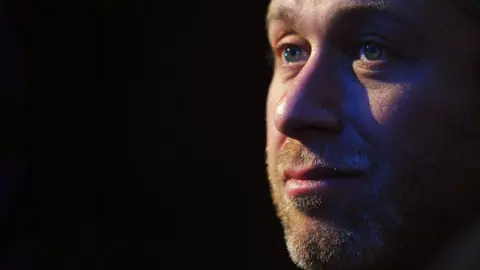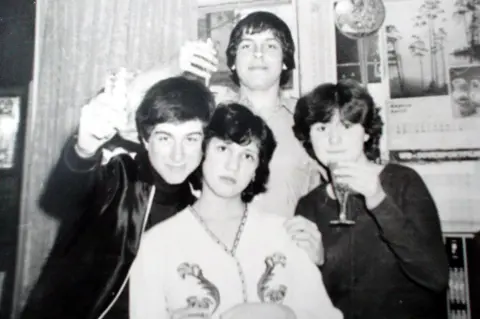Roman Abramovich: From orphan to sanctioned billionaire oligarch
 Getty Images
Getty ImagesHe became an orphan aged three but went on to become one of the world's richest men. Now Roman Abramovich's links to Vladimir Putin have stripped him of his businesses and reputation.
"I'm sure people will focus on me for three or four days but it will pass," said the Russian billionaire when he bought Chelsea Football Club in 2003. "They'll forget who I am, and I like that."
There's little chance of anonymity now, given the events of the last few weeks. Following years of demands for greater scrutiny of Mr Abramovich's dealings, the UK government has frozen his UK-held assets - including his homes, artworks and Chelsea FC - and imposed a travel ban.
It has accused him of being complicit with Mr Putin in the invasion of Ukraine.
This fall from grace for a man who has dominated British football but sharply divided sports fans in the process will be cheered by some. But he has overcome huge challenges before, notably in his early life.
Orphan to tycoon
Roman Arkadyevich Abramovich was born in Saratov in south-western Russia, a few hundred miles from the border with Ukraine, in 1966. His mother, Irina, died of blood poisoning when he was one year old and his father died two years later after an accident with a construction crane. After that Mr Abramovich was raised by relatives, spending time in Komi, in north-west Russia, where money was tight and winter temperatures low.
"To tell the truth I cannot call my childhood bad," he once told the Guardian in a rare interview. "In your childhood you can't compare things: one eats carrots, one eats candy, both taste good. As a child you cannot tell the difference."
 east2west news
east2west newsHe left school at 16, worked as a mechanic and served in the Red Army before selling plastic toys in Moscow. He moved on to perfumes and deodorants, building up his wealth as greater openness under Soviet leader Mikhail Gorbachev allowed more scope for entrepreneurs.
The 'Wild East'
The disintegration of the Soviet Union, and with it state command of mineral assets, provided more opportunities, and in his mid-20s, Mr Abramovich had a further stroke of good fortune.
He seized the oil company Sibneft from the Russian government in a rigged auction in 1995 for around $250m (£190m). He sold it back to the government for $13bn (£9.9bn ) in 2005.
His lawyers say there is no basis for alleging he amassed very substantial wealth through criminality. However, in 2012, he admitted in a UK court that he had made corrupt payments to help get the Sibneft deal going.
 east2west news
east2west newsHe became involved in the "aluminium wars" of the 1990s, in which oligarchs - those who had accrued vast fortunes and political power after the Soviet collapse - fought for control of this vast industry.
"Every three days, someone was being murdered," Mr Abramovich said in 2011, adding that this threat to his safety had made him a reluctant participant.
But Mr Abramovich further proved his own toughness, accruing hundreds of millions of pounds amid the chaos.
Entering politics
He became an ally of President Boris Yeltsin and a player in Moscow's post-Soviet political scene, even having an apartment in the Kremlin for a while.
When Mr Yeltsin resigned in 1999, Mr Abramovich was reportedly among those to back the prime minister and former KGB spy, Vladimir Putin, as his successor.
As Mr Putin established himself, he sought to assert his dominance over the oligarchs. Some went to prison, and others were exiled if they failed to show allegiance.
 Reuters
ReutersMr Abramovich suffered neither fate. In 2000, he was elected as governor of the deprived region of Chukotka, at the north-eastern tip of Russia. He gained popularity after investing his own money in social services but stepped down in 2008.
All the while, he kept his business interests going, taking on the trappings of wealth - buying up paintings, houses, cars.
London calls
In an unusual move for a man widely described as quiet, even shy, in 2003 Mr Abramovich made himself famous around the footballing world when he purchased Chelsea, west London's largest club, in a deal worth £140m.
"My whole philosophy in life is to bring in professional teams," he told the Financial Times. "In Chukotka I have professional teams on the ground and I will do this here too."
Under the management of Jose Mourinho and others, Mr Abramovich's wealth helped Chelsea towards five Premier Leagues, two Champions Leagues and five FA Cups.
 PA Media
PA MediaOligarchs' money has flooded into London in recent years. Mr Abramovich's own property portfolio is believed to include a15-bedroom mansion at Kensington Palace Gardens in west London, reportedly worth more than £150m; a flat in Chelsea; a ranch in Colorado; and a holiday home on the French Riviera.
His yachts - the Solaris and the Eclipse - are among the world's largest. Mr Abramovich, who has been divorced three times, also owns a personal jet.
Libel case
Asked by the Guardian in 2006 about what money can do for a person, he replied: "It cannot buy you happiness. Some independence, yes."
He certainly has plenty of money. Financial media giant Bloomberg estimates Mr Abramovich's fortune at $13.7bn (£10.6bn), ranking him as the world's 128th richest person. Its rival Forbes sets it at $12.3bn (£9.4bn), placing him 142nd.
What is under severe question, though, is the extent of his independence from Mr Putin.
Last year, Mr Abramovich sued publishing House HarperCollins for libel over a book, Putin's People by Catherine Belton, that claimed the Russian president had ordered him to buy Chelsea.
 Reuters
ReutersThe two sides settled out of court, with the publisher agreeing to make some clarifications.
But Mr Abramovich's associations with Mr Putin have continued to dog him, particularly when Russian forces built up on the border with Ukraine and then invaded.
When the freezing of the UK assets of Mr Abramovich and six other oligarchs was announced, Foreign Secretary Liz Truss said: "With their close links to Putin, they are complicit in his aggression. The blood of the Ukrainian people is on their hands."
Mr Abramovich announced the sale of Chelsea eight days before the sanctions were imposed. Some fans have continued to chant Mr Abramovich's name, but many politicians are calling for his assets to be seized, not just frozen.
"I hope that I will be able to visit Stamford Bridge one last time to say goodbye to all of you in person," Mr Abramovich has told Chelsea supporters. But a return to west London is unlikely for some time.
In a bizarre twist, it has now emerged that Mr Abramovich suffered symptoms of suspected poisoning - along with senior Ukrainian negotiators - at peace talks on the Ukraine-Belarus border in early March.
